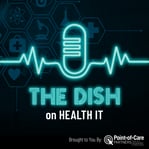Empowering Pharmacists: How Health IT Can Facilitate Seamless Data Exchange and Ease Workloads
In this episode of The Dish on Health IT Podcast, hosted by Tony Schueth, CEO of Point-of-Care Partners, the evolving role of pharmacists in the healthcare ecosystem is explored. Tony introduces the episode by highlighting Point-of-Care Partners as a health IT consultancy known for its deep expertise and trusted, objective perspective. He is joined by co-host Pooja Babbrah, a recognized expert in pharmacy standards and interoperability, and special guest Bob Katter, President of First Databank (FDB).
The conversation begins with an exploration of the increasing number of clinical services offered in pharmacy settings and how technology can enhance pharmacists' ability to operate at the top of their license. The importance of integrating pharmacists more significantly into the care team, especially to improve access to care in rural areas and support patient health outcomes, is emphasized.
Bob Katter shares insights into his journey in health IT and pharmacy sectors, reflecting on the significant advancements in electronic prescribing and the adoption of electronic health records (EHRs) since the early 2000s. He also acknowledges the challenges and opportunities that lie ahead.
The episode delves into the transformative role of pharmacists during the COVID-19 pandemic, highlighting their contributions to administering vaccines and treatments. Bob notes the legislative and regulatory changes at both state and federal levels that are expanding pharmacists' scope of practice, allowing them to take on more responsibilities traditionally reserved for physicians.
Bob discusses FDB's partnerships and initiatives aimed at supporting pharmacists in their expanding roles, including a project with a major pharmacy retailer focusing on drug utilization review (DUR) processes. He shares observations from his visits to pharmacies, noting how pharmacists are increasingly involved in direct patient care beyond their traditional dispensing duties.
Furthermore, the episode touches on international perspectives, mentioning Canada's "minor ailments" program that allows pharmacists to diagnose, treat, and prescribe for certain conditions. This program is highlighted as an example of leveraging pharmacists' skills to address physician shortages and improve patient access to care.
The conversation pivots towards the role of standards development organizations like the National Council for Prescription Drug Programs (NCPDP) and Health Level Seven International (HL7) in supporting the expanding clinical services provided by pharmacists. Bob Katter acknowledges the importance of these organizations while emphasizing the need for cooperation among industry players to utilize these standards effectively. Pooja Babbrah highlights innovative efforts, such as work group 20 at NCPDP, which focuses on care coordination and the potential for expanding the use of existing standards to include pharmacists in key patient care transitions, such as Admit, Discharge, Transfer (ADT) notifications.
The discussion then explores the application of artificial intelligence (AI) in healthcare, with a particular focus on FDB's initiatives. Bob Katter details how FDB leverages AI, including natural language processing (NLP) and generative AI, to enhance data curation, improve existing solutions, and collaborate with customers on developing new solutions to longstanding industry challenges. He underscores the potential of AI to streamline processes such as medication reconciliation and the authorization of specialty medications.
Pooja Babbrah expresses enthusiasm for the innovative use of AI in specialty medication automation and enrollment, emphasizing the importance of reducing the time it takes for patients to access necessary treatments. She mentions recent regulatory developments and the ongoing challenges in automating prior authorization for specialty medications due to their complexity and the dual coverage under pharmacy and medical benefits.
The podcast concludes with an invitation for any final messages or calls to action for the industry, emphasizing the collective vision and efforts towards automating and improving the delivery of healthcare services, particularly in the specialty medication domain. The dialogue throughout the episode reflects a shared commitment to leveraging technology and collaboration to enhance pharmacists' roles, improve patient care, and address the systemic challenges facing the healthcare industry.
In the final moments of the podcast, Bob Katter expresses his enthusiasm for the future of healthcare and encourages those at the beginning of their careers to consider the immense opportunities within the industry. He reflects on the significant advancements already made, such as nearly universal EHR adoption and electronic prescribing, but emphasizes that the greatest impacts for caregivers and patients are still on the horizon. Katter points to the rapid development of clinical science, including pharmacogenomics, and technological innovations like AI and cloud computing as driving forces behind these future advancements.
Pooja Babbrah shares this excitement, reminiscing about the early days of e-prescribing and looking forward to the next wave of innovation. She highlights the potential for pharmacists to practice at the top of their license, the reduction of burdens on pharmacists, and the integration of pharmacists into the care team as key areas of opportunity. Both Katter and Babbrah view the current moment as a new beginning for the industry, akin to the excitement surrounding the initial push for e-prescribing, but now with even greater potential for innovation and improvement in patient care.
The podcast concludes with a thank you to the guests and a reminder to listeners about where they can find episodes of The Dish on Health IT, signaling an optimistic outlook on the future of health IT and its capacity to enhance healthcare delivery and outcomes.
Stakeholders interested in monitoring state laws related to advance pharmacy practice can explore the POCP Regulatory Resource Center’s Pharmacist Advanced Practice Subscription as well as other subscription services.
Other Reference Links:





